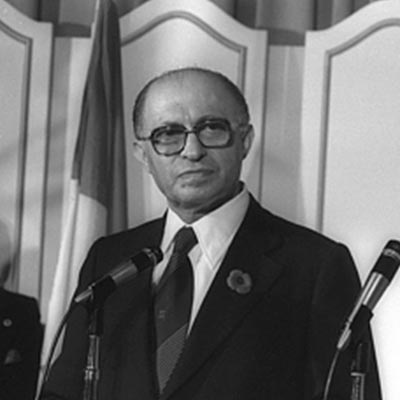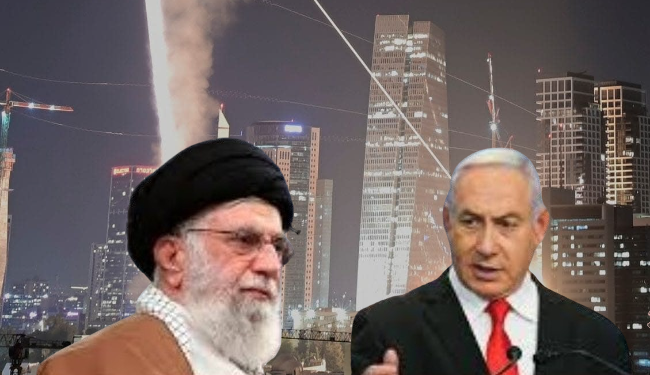
- The objective of the Begin Doctrine was to prevent countries hostile to Israel from developing a nuclear weapons capability.
- The Begin Doctrine was first put into practice in 1981, when Israel launched a surprise air strike against an Iraqi nuclear reactor that was under construction, on the belief that it was intended to produce nuclear weapons.
- This mentality of preventing a second Holocaust has led Israel to view security challenges from state actors like Iran and non-state actors like Hamas, Hezbollah, and the Houthis as existential challenges to the survival of the Jewish people and the state of Israel.
- Operation Rising Lion has been a stellar execution of the Begin Doctrine, wherein Israel has sought to disrupt Iran’s quest to develop nuclear weapons through kinetic military action.
A doctrine is a set of principles or guidelines that are used to guide the actions of a group or organisation, such as a military or government. These principles or guidelines are often formalised in official documents and are used to shape the decision-making and actions of the group or organisation. Doctrines can be used in a variety of contexts, such as military, political, religious, or economic.
Military doctrines can be classified into different types, such as defensive doctrine, offensive doctrine, and deterrence doctrine. A defensive doctrine is focused on the protection of one’s territory and citizens; an offensive doctrine is focused on attacking the enemy and achieving objectives; and a deterrence doctrine is focused on preventing the enemy from taking any aggressive action by showing the enemy the potential consequences.
The articulation and evolution of the Begin Doctrine
Menachem Begin, who was Israel’s Prime Minister from 1977-1983, drafted the unofficial doctrine, which was named after him, “the Begin Doctrine”. The objective of the Begin Doctrine was to prevent countries hostile to Israel from developing a nuclear weapons capability. It is essential to note that the Begin Doctrine is not a written formal policy, but rather a general principle that has guided Israel’s military and covert actions over the years.
The Begin Doctrine was first put into practice in 1981, when Israel launched a surprise air strike against an Iraqi nuclear reactor that was under construction, on the belief that it was intended to produce nuclear weapons. This operation, called Operation Opera, was justified by the Begin Doctrine, which holds that Israel will not allow any hostile country in the region to acquire nuclear weapons, as it would pose an existential threat to Israel.
The Begin Doctrine was once again put into practice in 2007, when Israel is believed to have carried out an air strike against a nuclear facility in Syria. The facility, located in the Deir ez-Zor region of eastern Syria, was believed to be a nuclear reactor under construction with North Korean assistance. Though the attack was not acknowledged by the Israeli government, it was widely reported in the media that the Israeli Air Force had carried out the attack.
The Iraqi and Syrian responses were minimal and did not lead to war. In 1981, Iraq was incapable of waging a war against Israel, as there was no common border between the two countries. Iraq at that time had no long-range missiles capable of reaching Israel and was engaged in an all-out war with Iran. Israel was widely criticised by the international community for its 1981 airstrike against Iraq’s nuclear reactor, as the attack was seen as a violation of international law and a violation of Iraq’s sovereignty. The United Nations Security Council passed a resolution condemning the attack, and many countries imposed sanctions on Israel. However, Israel’s then-Prime Minister Menachem Begin defended the operation as a necessary measure to protect the security of the state of Israel.
In 2007, following Israel’s airstrike against the Syrian nuclear reactor in the Deir ez-Zor region, Syria was poised for war against Israel from the common border, and it had chemical and biological weapons arsenals. Syria also drew confidence from what was then perceived as Hezbollah’s victory against Israel during the Second Lebanon War in July-August 2006. However, a war between Israel and Syria was averted due to the Israeli strategy of not claiming responsibility. This silence on the part of Israel granted then Syrian President Bashar al-Assad “room for denial”, and saved him the need to respond militarily to the attack.

In 2007, following the attack on the Syrian nuclear reactor, the international community was largely supportive of Israel because an internationally recognised “rogue state” such as North Korea had supplied the nuclear reactor to Syria. Syria also did not disclose its secret nuclear cooperation with North Korea to the International Atomic Energy Agency (IAEA), which further muted international condemnation of Israel’s military operation. Israel also informed its allies, such as the United States, before its air strike against Syria’s nuclear reactor in 2007.
The implementation of the Begin Doctrine in 1981 and 2007 brought to light two important factors that greatly influence Israel’s strategic culture concerning its adversaries, including Iran. The first factor which greatly influences Israel’s strategic culture is the memory of the Holocaust in which six million Jews were exterminated by Nazi Germany during the Second World War. Since Israel’s independence in 1948, Israeli political and military leaders have vowed that Israel, as a Jewish state, will not allow a repeat of the Holocaust against Jews living in Israel and anywhere else in the world.
This mentality of avoiding a second Holocaust has led Israel to view security challenges from state actors like Iran and non-state actors like Hamas, Hezbollah, and the Houthis as existential challenges to the survival of the Jewish people and the state of Israel. This, in turn, leads Israel to favour the use of overwhelming military force against what it perceives to be existential threats to the survival of Israel as a Jewish state. This mentality of preventing a second Holocaust was reflected in former Israeli prime minister Yair Lapid’s speech before the United Nations General Assembly in 2022 in which he stated “This time, we are not standing empty- handed against those who want to destroy us. The Jews today have a state. We have an army. We will do whatever it takes: Iran will not get a nuclear weapon”.
This mentality of preventing a second Holocaust has led Israel to undertake military actions to protect its national security even without consulting its most important diplomatic and security ally, the United States. The memory of the Holocaust is often weaponized by Israel’s political and military leaders to gain support from the United States and other European countries for Israel’s military actions against its adversaries like Iran and Iranian proxies like Hamas and Hezbollah based on the argument that Israel is acting to prevent a second Holocaust of the Jews.
The second factor that greatly influences Israel’s strategic culture is the perception of exceptionalism, i.e., assuming that Israel faces unique and idiosyncratic threats which must be addressed by exceptional measures; and of solitude, i.e., self-reliance underpinned by scepticism of international support. While Israel constantly searches for international support and legitimacy, its foreign policy has often discounted the world and assumed that Israel has only itself to trust. In its current approach towards Iran and the corresponding calls to the international community for pressuring Iran, Israel manifests both exceptionalism and a perception of solitude.
Israeli leaders believe that Israel’s conflict with Iran is exceptional, since it is a rare case of a member state of the United Nations (Iran) openly threatening to destroy another member state (Israel), while its leaders openly question the Holocaust. This, along with Iran’s quest to develop nuclear weapons, has convinced Israel’s leaders that Israel will have to undertake military and other covert actions to disrupt and sabotage Iran’s quest to develop nuclear weapons capabilities.
Examining the Begin Doctrine in the context of Operation Rising Lion

For nearly three decades, Israel’s current Prime Minister, Benjamin Netanyahu, and other Israeli leaders have vowed that Israel would not allow Iran to get a nuclear weapon. Thus, in keeping with the Begin Doctrine, various efforts were made by Israel to prevent Iran from developing a nuclear weapons capability, which included the assassinations of Iranian nuclear scientists and operations similar to the one carried out against Hezbollah in Lebanon using exploding pagers, which were directed at Iran.
In one tactic, straw companies were established around the world to sell Iran defective components for its nuclear program. The goal was to ensure that when Iran spun its centrifuges, they would malfunction or explode. Additionally, cyber attacks like Stuxnet were deployed.
All these Israeli covert operations were meant to set back Iran’s nuclear program. It was an effort to buy time amid the hope that, in the meantime, either Iran might reconsider the cost, sanctions might change its calculations, or there would be a regime change. However, none of that happened, and Iran marched forward with its nuclear program. This led Israel’s Prime Minister Netanyahu to authorise the Israel Defence Forces (IDF) to carry out Operation Rising Lion in June 2025.
On the morning of 15 June 2025, the IDF deployed over 200 fighter jets to execute Operation Rising Lion. In the first wave of attacks, IDF fighter jets launched coordinated attacks over 2,000 kilometres from Israel, targeting more than 100 military sites, including nuclear facilities and senior Iranian military leadership.
The IDF confirmed the elimination of key figures within Iran’s security leadership. These included Iranian Chief of General Staff Mohammad Bagheri, Revolutionary Guards Commander Hossein Salami, Emergency Command Head Gholam-Ali Rashid, and IRGC Aerospace Forces Commander Amir Ali Hajizadeh. In addition to strikes on nuclear targets in Isfahan and Natanz – the latter being Iran’s largest enrichment site – the IDF also targeted Iranian aerial defence systems in western Iran.
Iran retaliated against Israel’s airstrikes by launching hundreds of UAVs and close to 100 ballistic missiles at civilian centres in Israel, damaging infrastructure and residential buildings. Most of the ballistic missiles were successfully intercepted by Israel’s aerial defence systems; however, some missiles managed to get through the aerial defence systems, which has so far resulted in the deaths of three Israelis and the wounding of a dozen others.
Israel’s Defence Minister, Israel Katz, warned Iran’s Supreme Leader, Ayatollah Ali Khamenei, that “Tehran will burn” if it keeps firing missiles at Israeli civilians. This indicates that the present conflict between Israel and Iran is far from over, with both sides launching drones and missiles against each other. Unless significant international pressure is exerted on both countries there is a risk of prolonged conflict in the Gulf region, which could result in Iran’s proxies such as the Houthis launching drones and missile attacks against Gulf shipping lanes or energy infrastructure, which, even if limited, could rattle energy markets and alarm Arab capitals.
Conclusion
Operation Rising Lion has been a stellar execution of the Begin Doctrine, wherein Israel has sought to disrupt Iran’s quest to develop nuclear weapons through kinetic military action. However, relying solely on kinetic military action to manage national security challenges results in Israel and the wider West Asian region being dragged into a never-ending cycle of conflict. Therefore, Israel needs to develop a comprehensive national security strategy that includes political, diplomatic, and economic tools of statecraft and not just kinetic military action in order to comprehensively address its national security challenges from state and non-state actors.
References
- Akram, M (2023). Israel’s Begin Doctrine. Retrieved from https://www.paradigmshift.com.pk/israel-begin-doctrine/
- Chakraborty, R. (2024). The Evolution of Israel’s National Security Doctrine: A Journey from Ben- Gurion to Netanyahu. Walnut Publication
- Defence Industry Europe (2025). Operation “Rising Lion”: IDF targets Iran’s nuclear programme in coordinated offensive. Retrieved from https://defence-industry.eu/operation-rising-lion-idf-targets-irans-nuclear-programme-in-coordinated-offensive/
- Hasnain, S (2025). Bombs And Drones Leave the Middle East In Flux. Retrieved from https://basispointinsight.com/Story/Home/bombs-and-drones-leave-the-middle-east-in-flux_c40986c34347.html
- Keinon, H (2025). Why Israel will always act alone when needed to defend itself – analysis. Retrieved from https://www.jpost.com/israel-news/article-857607
- Mahadevan , P ( 2024 ). Spies Among The Sands: Assessing Seven Decades of the Mossad and Israeli National Security. Wisdom Tree
- Shapira, I ( 2022 ). Israeli Strategic Culture And The Quest To Ensure Iran Never Gets Nuclear Weapons. Retrieved from https://www.19fortyfive.com/2022/10/israeli-strategic-culture-and-the-quest-to-ensure-iran-never-gets-nuclear-weapons/
- Yadlin, A. ( 2018 ). The Begin Doctrine. Retrieved from https://www.inss.org.il/publication/the-begin-doctrine-the-lessons-of-osirak-and-deir-ez-zor/
Dhruv Ashok is a PhD research scholar from Christ (Deemed to be University), Bangalore. He writes on current affairs and international politics. His areas of interest include conflict resolution and historical narratives. Views expressed are the author’s own.
